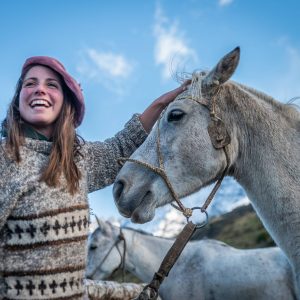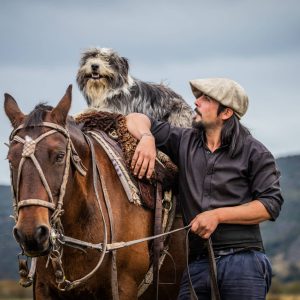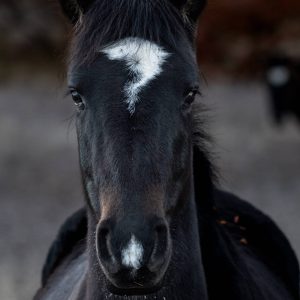About Us
Mission
Using our unique field experience, we open the doors of the authentic rural Patagonian way of life to adventurers, and leave a long-lasting mark on them.
Vision
Be a world reference in the outreach of the Chilean Patagonian cultural heritage and organization of wild horseback trails.
Values

Respect all animals and our environment

Support local community and culture

HAVING A NICE TIME WITH OUR PARTICIPANTS

To be authentic and humble

Charlotte FrErot
Lifelong horse lover, Charlotte Frerot left a comfortable life in Paris to seize the reins of her destiny. She studied Sustainable Business Administration and worked with a UN program in Paris before moving to Chile in 2017. After years working on estancias in Torres del Paine and Tierra del Fuego—and driven by her dream of sharing her love for Patagonia’s untamed landscapes and culture—she founded Galope Austral in 2021. Charlotte personally tames and trains her own horses, competes in regional endurance riding championships, and is renowned as a true horsewoman—living an authentic, off-grid life deeply rooted in the spirit of Patagonia.
Born in France, Charlotte speaks French, English, Spanish and has Wilderness First Responder certification. She will be your guide in the wild and the organizer of your journey.

Enrique Bascur
Enrique Bascur grew up around horses from the age of seven. He studied Adventure Tourism and made his way to Chiloé, where he deepened his connection with equine culture. Later, the vast lands of Tierra del Fuego challenged and shaped him. He spent several seasons there, taming wild horses and living the estancia lifestyle, learning from the land and its people. In 2021, his journey brought him to Torres del Paine, where he worked at various hotels before joining the Galope Austral team. Enrique now brings the true gaucho lifestyle to life—with warmth and skill—and shares the countless stories that come with it for a meaningful Patagonian experience.
Enrique speaks English, Spanish and has Wilderness First Responder certification. He will be your cook and guide in the wild!

OUR HERD
We have a herd of 13 horses, carefully selected and trained to suit riders of all levels. They are mixed breeds — Arab, Quarter Horse, Chilean, Criollo, and traditional working horses — noble, strong, and gentle. Their well-being is our top priority. They receive all the care needed to ensure their health and physical condition. When they’re not working, they live freely in a large pasture with unlimited grass, room to roam, and the company of their herd — essential conditions for their life balance and happiness.
Horses are still a keystone in the local culture, with the Chilean breed as national pride. Local horses are tireless and adapted to the climate. They are gentle and brave partners who will lead you to the most remote places.
With care and experience, we’ll choose the perfect riding partner for you.
A BIT OF HISTORY
In a pristine and unwelcoming land at the end of the world, the first immigrants settled in Patagonia to breed sheep at the end of the 19th century.
Synergies between immigration, international markets, politics, geography, and climate made the colonization grow and the native inhabitants disappear.
During the 20th century, breeding sheep and selling wool became an empire in Patagonia called Sociedad Explotadora de Tierra del Fuego. Renting, buying, or merging, it took control of up to 3.000.000 hectares of lands and industrialized the business thanks to the last European innovations, until its dissolution in 1973.
The National Agricultural reform (1962-1973) finally allowed its workers to acquire land and start their own ranches, with some training and follow-up. Here starts rural Patagonia as we know it today. The ‘baqueanos’, skilled horseback pathfinders that were living maps of the area, started to settle in estancias as ‘gauchos’.
Torres del Payne area and the broader Chilean Patagonia are mainly composed of vast private lands, which makes it very difficult for foreign travelers to roam.
Yet here remains the authentic essence of Patagonia.


